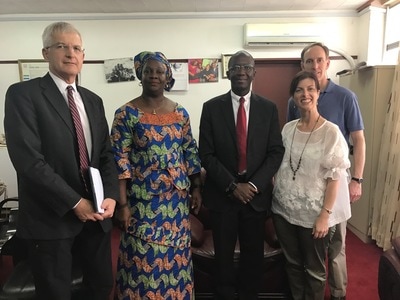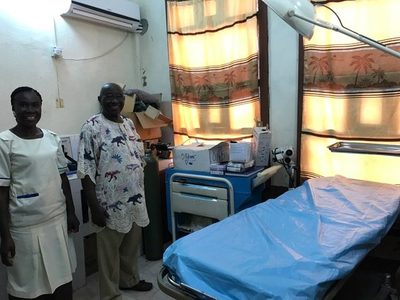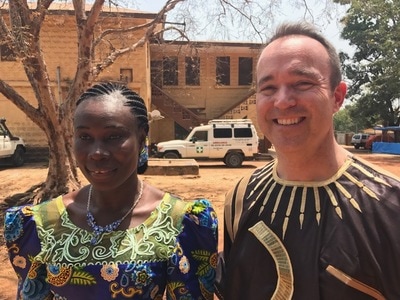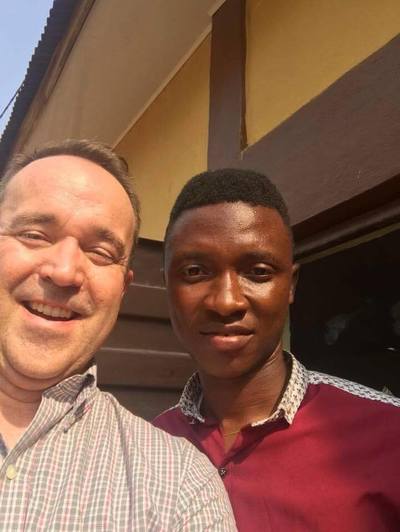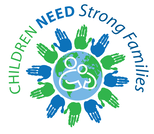|
(By Chris Smith, reblogged from www.galileeumc.org/mercy-hospital-health-sierra-leone
It isn’t often that you find yourself at the Ministry of Health in a capital city, speaking to the man in charge of medicine for a whole country, talking about the future of healthcare. It’s not something that Pastor Jason planned, either, when he agreed to fly to Sierra Leone on a mission to Mercy Hospital and the Child Rescue Center. But when Jason’s plane touched down in Freetown, he discovered that Galilee wasn’t supporting a mission in the middle of nowhere. Galilee’s support for Mercy Hospital is at the center of Sierra Leone’s plan for providing excellent healthcare to all its citizens in the future. One of the first things that Jason did in Africa, with our team from Helping Children Worldwide, was meet with Dr Abu Bakarr Fofanah, Minister of Health and Sanitation for Sierra Leone. “One of the definitions of a “God moment” is finding yourself in a place where you can make a difference. That’s where we are with Mercy Hospital at this moment,” explains Jason. “The hospital was built almost ten years ago, when our emphasis in Bo was on the orphans of civil war. In the intervening years, there have been additional crises, especially the Ebola epidemic of 2013-2016. That situation, thank God, is abated—so the government has breathing space to examine what needs to be done to prevent future crises. The Ministry of Health is taking a community approach to medicine and healthcare, and Mercy Hospital is leading the way.” “As we listened to the Minister of Health, it became clear that there are two main problems with healthcare in Sierra Leone. First, it barely exists. And second, people don’t trust it.” “That second point shouldn’t shock anyone. In our own country, especially among men, it’s common for folks to avoid doctors. There’s a he-man culture of “I don’t need a doctor, I’ll tough this out.” Or we can be dissuaded by the thought, “How will I pay for a doctor’s visit? Do I have the right insurance?”” “In Sierra Leone, those tendencies are magnified enormously. There is tremendous poverty. And imagine how skeptical of doctors you would be if you’d never been to a doctor’s office before. Nor had your parents, or grandparents. Maybe the first time you heard the word “hospital” was when UN health experts appeared in your village wearing what looked like space suits and people were dying from Ebola. You’d be more than a little scared! You’d be quite averse to Western medicine.” “So we’re working on two fronts: providing medical care regardless of ability to pay and changing minds about Western medicine through outreach and education.” “Mercy Hospital will celebrate ten years in operation this fall, and it’s growing. The 35 bed hospital is in the construction phase of a surgical theater on the first floor, mainly for c-sections. A Cesarean procedure costs about fifty dollars and right now in Bo, there’s no place to get one. Mothers and infants die because of this, but we’re going to stop that.” “Mercy also provides mobile clinics in the villages around Bo. These mobile units do simple procedures and blood work, as well as test for diseases like malaria, HIV, and typhoid. Even more important, perhaps, they educate the people and familiarize those in remote villages with the normal routines of medicine and best practices of care. One avoidable cause of infant mortality is the folk practice of finger-feeding babies. Mothers finger-feed their infants adult food, which leads to choking. A patient, kind, and committed doctor or nurse—a doctor or nurse who looks and speaks like the villagers themselves (because he or she graduated from the Child Rescue Centre)—can do wonders in educating a population that doesn’t get newspapers or mail or own a television.” “Mercy’s mission is to improve child and maternal health and provide medical help to all, regardless of ability to pay. Together with Helping Children Worldwide and Galilee, Mercy Hospital is working with the Ministry of Health and the UMC in Sierra Leone to develop a health care system with community-based care throughout the country. The goal is to empower communities to care for themselves through knowledge and prevention, and provide support to those needing critical treatment. Mercy has already begun to establish the foundation for a “hub and spoke” system whereby the hospital provides support to outlying villages (“spokes”) through regular medical outreach clinics, while more complicated cases are referred to Mercy Hospital at the “hub.” “Isn’t this just how the church operates? We’re all sent to do work among many spokes, but at the center of all this activity there needs to be God, the great hub.” “I am so proud to be the pastor of a church that has stood by the people of Bo for sixteen years, and has made Mercy Hospital a reality. The good news now is that so much more is possible. We’ll be celebrating Mercy’s tenth anniversary this fall. I want to hold the mission up at that time, but even now you can do something. As little as $50 can save the life of a mother and child.” “We’re in partnership with Mercy Hospital, and we can be truly effective partners. Why? Because we’re in partnership with a merciful and loving God.”
1 Comment
Laura Horvath
3/28/2017 04:46:31 pm
As our good friend Cynthia Horner points out, "while Mercy Hospital is not the only maternity center providing cesarean sections in the region (there are many private hospitals and the government hospital which offer C-sections as well), Mercy UMC Hospital is the only one that will be able to consistently to do them regardless of ability to pay. Good for the poor and good for the entire community; and good for all of our souls."
Reply
Your comment will be posted after it is approved.
Leave a Reply. |
Follow us on social media
Archive
July 2024
Click the button to read heartfelt tributes to a beloved Bishop, co- founder of our mission!
Post
|
Helping Children Worldwide is a 501 (c) 3 nonprofit organization | 703-793-9521 | [email protected]
©2017 - 2021 Helping Children Worldwide
All donations in the United States are tax-deductible in full or part. | Donor and Privacy Policy
©2017 - 2021 Helping Children Worldwide
All donations in the United States are tax-deductible in full or part. | Donor and Privacy Policy

